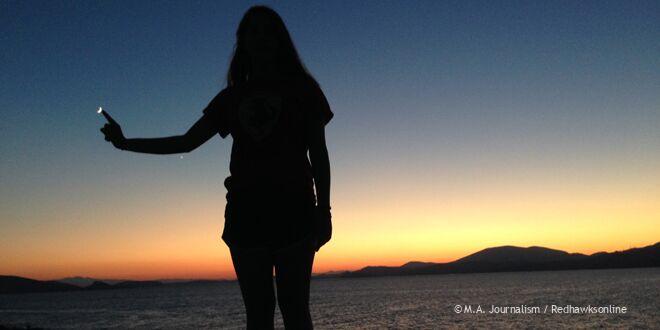She leaned over the edge and discovered a steep drop into teal blue water. Suddenly, a Target logo of ripples exploded on the calm surface. Her cousin hit the clear water with legs tucked neatly in a cannon ball.
“Elizabeth, jump!” her other cousins chanted from below.
Nodding, junior Elizabeth Dovolis launched off of the scorching rocks and into the aqua water of the Aegean Sea. Dovolis spent a month in Greece with relatives this summer, cave jumping and island hopping as the Greek nation teetered on the edge of a cliff.
Greece is in the middle of a financial crisis, confronted with serious international debt, political turmoil, surges of incoming refugees from Syria, and an unemployment rate worse than that of the Great Depression.
Its instability appeared in headlines throughout the summer and mounted into stacks of complex political and economic jargon. However, for Dovolis, Greece’s current state is a story about her family.
“They’re trying to figure out plan B,” Dovolis said about her Greek relatives handling the crisis. “One side ofthe family wants to leave and the other side of the family wants to stay.”
Dovolis’ Aunt Marion and Uncle Dimitris want to stay because they own three properties and have their medical practice in Greece. But wealth is not always a shield.
When Dovolis flew into Athens in July, her Canadian relatives brought cash for Demitris and Marion.
“Dimitris is a doctor and he makes mad money. But all their money is trapped in the banks and they can only withdraw 60 euros a day,” Dovolis explained, referencing the restrictions that Greece enforced after facing threats of being kicked out of the Eurozone.
The Eurozone is a collection of 19 European nations, bound underneath the common currency of the euro. Europe threatened to remove Greece from the zone in July, when the Greek government and European creditors could not come to agreements.
When Greece found itself in a deepening hole of debt, Europe reached out to help. Greece was offered significant financial assistance from three of the most influential organizations in Europe. In July, The International Monetary Fund, European Commission, and the European Central Bank offered billions of euros and allowed Greece to take a bailout from a crucial payment.
In return, Greece was asked to make reforms in their economy called ‘austerity measures’, which included cutting pension cuts, raising sales taxes, creating new business competition and loosening labor unions.
Greek Prime Minister Alexis Tsipras didn’t want to accept these strict austerity measures, so he enforced a national referendum, in which Greek citizens voted on whether or not to make the deal. This vote angered the creditors and Eurozone threatened to kick out Greece.
“My family was really scared that the European Union was going to kick out Greece and that Greece would have to transfer back to the drachma,” Dovolis said, addressing the national fear.
Losing membership in the Eurozone would mean losing the euro as a currency, and Greece would be forced to return to the former currency of the drachma. But the drachma is worth less than the euro, so a switch would make Greeks lose value in their money. This caused panic.
“My aunt is trying to move out of Greece,” Dovolis said about her aunt Katerina. “She took all her money out of the bank before they placed the withdrawal limits.”
In June, Greek government limited bank withdrawals to prevent citizens from frantically bailing all their money out as Katerina did. Not as proactive as Katerina, Dimitris and Marion stood in long lines at the ATMs, afraid that Greece would vote ‘no’ in the referendum.
Dovolis’ family voted with the minority. Greece voted against taking Europe’s deal.
However, still needing financial assistance, Tsipras was forced to propose a second deal which had almost identical terms to the deal that was just rejected.
The new deal of austerity measures was not accepted well within the prime minister’s own political party. In angry reaction, protests and movements were conducted against Tsipras, and on August 17, he resigned as Prime Minister and snap elections were called.
“Everyone seemed to hate the prime minister,” Dovolis said. “He’s a dinner table topic. I only understood a little bit because of my limited Greek, but enough to know that everyone was bashing him.”
Despite heated political talk around the dinner table, Dovolis acknowledged a level of normality that remained in her relatives.
“Everyone seemed to remain relatively calm and the same,” Dovolis explained. “My uncle drove us up a mountain in his convertible, blasting 80s tunes in the middle of the night.”
So as Greece appears in headlines for their debt crisis, Dovolis flips through photos from her month long trip. She does not see only the skyline of a city in crisis, but a trip characterized by late night convertible drives, large family meals with lots of fish, and the time she got to spend with her relatives: island hopping and cave jumping into the clearest water she had ever seen.

